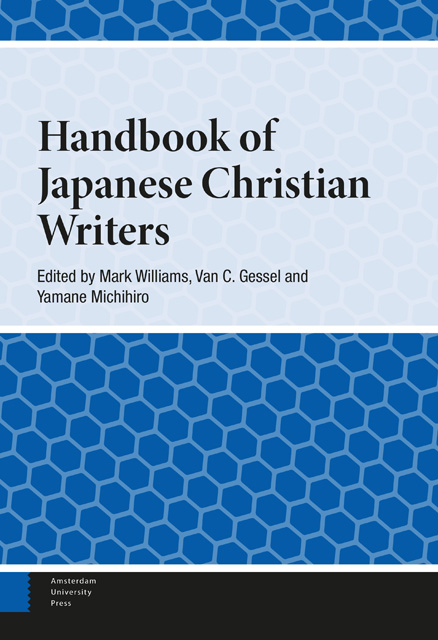Book contents
- Frontmatter
- Contents
- Contributors
- Abbreviations
- Preface
- Introduction
- 1 Prophet of the Inner Life: Kitamura Tōkoku
- 2 Shimazaki Tōson and Christianity: When the Cherries Ripen in the Taishō Period
- 3 Arishima Takeo and Christianity
- 4 Akutagawa Ryūnosuke: A Christian Life
- 5 Incarnation of the Christian Faith in the Poetry of Yagi Jūkichi
- 6 Hori Tatsuo: The Cross Dyed in Bloody Red and the Little Gods of Ancient Times
- 7 Nagai Takashi on Divine Providence and Christian Self-Surrender: Towards a New Understanding of hansai
- 8 Dazai Osamu: His Wrestle with the Bible
- 9 Shiina Rinzō: His Two Visages
- 10 From out of the Depths: Shimao Toshio’s Literary Response to Adversity
- 11 Yasuoka Shōtarō and Christianity: From Postwar “Emptiness” to Religious Longing
- 12 Miura Ayako and the Human Face of Faith
- 13 Endō Shūsaku and the Compassionate Companionship of Christ
- 14 Ogawa Kunio: Renewal of Faith and Identity in His seishomono (Bible Stories)
- 15 Kaga Otohiko: In Search of What Lies Beyond Death
- 16 Sono Ayako: Amor Vincit Omnia
- 17 Takahashi Takako: Drawing Closer to God Through Literature
- Index
- Index of titles
13 - Endō Shūsaku and the Compassionate Companionship of Christ
Published online by Cambridge University Press: 09 June 2023
- Frontmatter
- Contents
- Contributors
- Abbreviations
- Preface
- Introduction
- 1 Prophet of the Inner Life: Kitamura Tōkoku
- 2 Shimazaki Tōson and Christianity: When the Cherries Ripen in the Taishō Period
- 3 Arishima Takeo and Christianity
- 4 Akutagawa Ryūnosuke: A Christian Life
- 5 Incarnation of the Christian Faith in the Poetry of Yagi Jūkichi
- 6 Hori Tatsuo: The Cross Dyed in Bloody Red and the Little Gods of Ancient Times
- 7 Nagai Takashi on Divine Providence and Christian Self-Surrender: Towards a New Understanding of hansai
- 8 Dazai Osamu: His Wrestle with the Bible
- 9 Shiina Rinzō: His Two Visages
- 10 From out of the Depths: Shimao Toshio’s Literary Response to Adversity
- 11 Yasuoka Shōtarō and Christianity: From Postwar “Emptiness” to Religious Longing
- 12 Miura Ayako and the Human Face of Faith
- 13 Endō Shūsaku and the Compassionate Companionship of Christ
- 14 Ogawa Kunio: Renewal of Faith and Identity in His seishomono (Bible Stories)
- 15 Kaga Otohiko: In Search of What Lies Beyond Death
- 16 Sono Ayako: Amor Vincit Omnia
- 17 Takahashi Takako: Drawing Closer to God Through Literature
- Index
- Index of titles
Summary
With a substantial readership and a solid international reputation, Endō Shūsaku is demonstrably the most important and influential Christian writer that Japan has produced to date. Beginning with a baptism at age 12 that he described as his mother dressing him in ill-fitting western clothing, Endō grappled throughout his career to re-tailor Christianity to make it more accessible to his Japanese readers. Struggles with his own faith and chronic illness with lengthy hospitalizations led him to create an image of a forgiving, maternal Christ who is an “eternal companion” for all who suffer. In powerful novels such as the internationally acclaimed Silence, along with The Samurai and Deep River, Endō exerted significant and enduring influence on Japanese attitudes toward Christianity.
Introduction
Of all the authors in this handbook who were influenced to varying degrees by Christianity, none achieved as wide a readership or as loyal a following both in Japan and overseas as did Endō Shūsaku (1923–1996). In many of Endō's works, the challenge of being a Christian in Japan is foregrounded more consistently and unapologetically than in the writings of most other Christian authors. And as a spiritual godfather, he influenced a number of authors and critics to convert to Christianity, including three writers considered in this volume: Yasuoka Shōtarō, Kaga Otohiko and Takahashi Takako.
Critics who study his writings concur that Endō's career can be broadly demarcated into two periods: before and after the publication of Chinmoku (Silence*) in 1966. That novel perhaps best exemplifies one of the most distinguishing characteristics of his work: his identification with individuals in Japanese history who, like himself, are earnestly seeking after some source of consolation as they suffer physical and spiritual pain, defeat, a weakness born of fear and faltering faith and ultimately death. That ongoing search played out amidst his own struggles with faith and life-threatening illness; this quest joined his personal experiences (centered around his complicated feelings toward his mother) and his beliefs in Christianity (literally sprinkled onto him before he was old enough to understand what was happening) to shape a distinctive image of Christ in his writings.
- Type
- Chapter
- Information
- Handbook of Japanese Christian Writers , pp. 232 - 261Publisher: Amsterdam University PressPrint publication year: 2022



